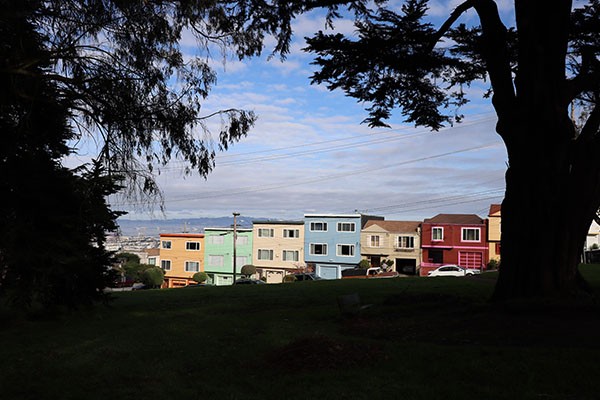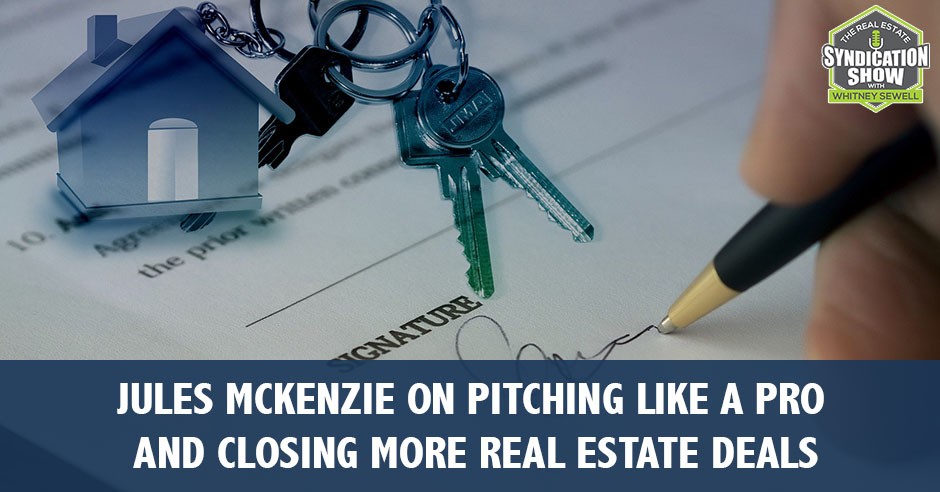Listen to the podcast here:
Many people who have started investing in real estate and closing real estate deals began with a full-time job. A successful rental housing provider in Central East Ontario for 17 years and also a police officer for 29 years to date, Jules McKenzie reveals the secret to managing two worlds at a time. As he walks us through his relationship with investors and his kickoff to finding deals that are cash flow positive, Jules teaches us how to employ proper strategies to purchase, renovate, refinance, and then attract investors. He also offers some tips on pitching deals and nurturing investor relationships.
Our Gracious Sponsor:
Are you wanting to learn how to gain financial freedom through having your own syndication business? Text LEARN to 474747 to begin to learn from one of the best in the industry, Vinney Chopra. Vinney came to the US with only $7 in his pocket, and now controls hundreds of millions of dollars of real estate he has acquired through multifamily syndication. He is now personally coaching others to do the same. Text LEARN to 474747 to begin your journey to starting your own syndication business! Vinneychopra.com
—
Watch the episode here:
Jules McKenzie on Pitching Like A Pro And Closing More Real Estate Deals
Our guest is Jules McKenzie. Thanks for being on the show, Jules.
Whitney, thanks for having me.
I appreciate your time and sharing your expertise with the readers and me. Jules has been investing in residential real estate in the Orillia and Barrie areas in Central Eastern Canada for over seventeen years. His strategy has been buying and holding. He’s holding twenty investment properties. His portfolio is a mix of single-family condominiums, townhomes and small multifamily buildings. He’s raised the money to buy his properties from joint venture investors. He manages his own properties with his beautiful wife, Ange. He’s also a police officer with the Rama Police Service. He has policing experience of several years. Thank you, Jules, for your service and being a police officer. He will share his knowledge and experience from investing in the Orillia area and how he acquired his portfolio with investors. Give the audience a little more about who you are and what your focus is.
I’m Jules McKenzie. I work professionally as a police officer for several years. For the last seventeen years, my beautiful wife, Ange and I have been investing in real estate as a means to supplement retirement income when we do retire so we can maintain our awesome lifestyle here in Orillia. However, it turned out to be much more than that. We get to travel, we get to do cool things. We’re down in Sarasota, Florida. That was a real nice break from a blustery, freezing cold winter up here. I like to go to Vegas a couple of times. I’d like to go to Phoenix, Arizona and explore the desert outside the Grand Canyon. Investing in real estate has enabled us to do those things and travel and have fun.
One thing I find innate is that you’ve been investing in real estate all this time, but also working full-time. I know a lot of that resonates probably with a lot of the audience as well. When I was a police officer, that was when I was pushed to find something else because of the lack of income from where I was working. That’s what pushed me into real estate. As far as working full-time and doing real estate as well, can you tell us a little bit about why you decided to do that? How has that changed over the years and how do you manage two jobs?
One of the reasons that we got into managing our own properties was because there wasn’t good property management available. With my background as a police officer, as you know, we’re required to study legislation, understand how to enforce laws and as a landlord, you have to be able to enforce leases, enforce laws when the tenants don’t pay. I found that my ability to be a good self-manager of my properties was well-serving. My shift schedules prior to the new schedule I’m on was two days shifts, two-night shifts and constantly up to four. We’re constantly working a 48 hour work week with four days off, which enabled me to do cool things like invest in real estate and management properties.
[bctt tweet=”Most investors don’t want to invest in real estate because they have to deal with tenants. ” via=”no”]
You had a good schedule that allowed for a time to be spent doing something else and not working long days while trying to do two jobs on the same day. You’re still doing two different jobs. How has that changed over the years as far as how you’ve learned to manage your real estate business while also keeping your day job?
Technology has helped us to do things in a more systematic approach. For example, we don’t have to go to doors anymore, collect rent with cash and issue a receipt. We collect rents by e-Transfer. We can communicate with our tenants through text message. A lot of my service providers, plumbers, electricians and handyman, they also text. If there’s an issue, I can receive a complaint about a maintenance issue on one of my properties. I can simply copy and paste and send it to my maintenance guy with the address and the tenant’s contact information and get that shored up and looked after quickly. My beautiful wife does all the record keeping on QuickBooks, which is an automated computer system. She fires that off by email to our accountants so we can have proper record keeping and reporting to the government because we still got to pay our income tax up here.
You found some technological ways that have assisted in making those easier to manage these systems, manage your tenants, ways to communicate with them and collecting rents. That’s pretty important. How did you get started working with investors? How soon in your real estate career where you are working with investors?
I was talking about American icons that I’ve studied and read. One of the things that happened to me in my career, I was with the OPP. We transferred to Orillia. I was working in Rama and I came home from shift one day and my wife was entertaining some guests and there was a guy drawing circles on a whiteboard. That was my introduction to the Amway business. While we didn’t make any money in that business, I did read the books, go to seminars, listen to the cassette tapes and I started studying and learning. That changed my life dramatically. My wife pulled me back out of it. I saw a late night TV infomercial for a real estate investing course.
That resonated with me the ability to buy income-producing properties and start generating wealth. When I joined, I made several mistakes. I was trying to employ techniques that were not applicable to Orillia and Barrie markets. I got myself into some financial trouble. We had multiple income properties that were in need of renovation. They had vacant units. I had no visible means of paying the debt on those and we had a huge line of credit card debt to pay. We were in a tough way. A mentor that I had been working with said, “You need to come to Toronto for a seminar.” Raymond Aaron, a Canadian author, was hosting a wealth building seminar and that’s where I met Don Campbell.
At that time, it was around 2003, I remember going to the seminar and my wife’s saying, “Don’t sign anything. Don’t buy anything. Don’t do anything unless you check with me first. I’m not going to that crazy seminar.” She thought I was crazy for going. I went there and listened to Don Campbell. He started talking about the top ten towns to invest in. Top ten towns based on true positive economic fundamentals, population growth, job growth and transportation improvements. When he went through the list, he was talking about areas in the Greater Toronto area. He was talking about Hamilton, which is outside of Toronto. He was talking about Whitby, Oshawa. I thought, at least I know where I should have been investing. In my mind, I was going to quit because I was broke and had properties in disrepair. He talked about the absolute number one area to invest in residential real estate according to the Ontario top ten towns and that was the Barrie-Orillia Corridor.

I lost it. I jumped up and down. I was screaming and I was whooping and hollering in the back. Don Campbell from the stage looked down and he says, “If you want to learn about those areas, I suspect it’s that maniac jumping around in the back there. He’s probably from those areas.” It was not an immediate quick fix. We did have to endure some financial pain and suffering. Once we got through that, we started learning about techniques specific to our real estate market up here. Through that, that’s when I started finding the deals that would appreciate, finding deals that’s cashflow positive.
Finding the deals and employing proper strategies to purchase, renovate and refinance employing that BRRRR Strategy and then attracting investors. Taking my knowledge, expertise, experience and bringing that to my REIN meeting. Up here, we have the Real Estate Investment Network, which is a national organization, which is all things real estate investing. I’ve been a part of that network. Once a month, I go down and meet with likeminded investors. I bring in deals. There are some months that I do well. There are some months that I strike out, but that’s how I started building my investment career.
You first start out and you got in trouble and then you found your mentor. You told me that he’d become a mentor and he liked the area that you were already in. Did you say that you were investing and you got in trouble but was it because of some of the areas you are investing in as well?
I think it was being a relatively new investor and not fully understanding the strategies that you need to employ. In real estate investing, you need a strong plan. If you’re going to buy into something rough and run down, which is what some of these initial courses I took were teaching us to do. You need to employ a good sound strategy to renovate and refinance that property or sell that property.
What did you do differently when you finally got a handle on this and went forward then?
I started looking at investing from the macro instead of the micro. I was already fortunate to be in the Orillia and Barrie area, which was economically the number one area to invest in residential real estate. We all started looking at the macro, the whole geographic area. We started breaking it down to smaller neighborhoods. Areas that were in transition from a bad area to a good area. I was fortunate that some of my problem properties were actually in transition areas. That’s what changed. We started taking a more sophisticated systematic look and approach to analyzing our deals prior to getting in.
[bctt tweet=”Employ technologies that are available and lighten the load in terms of the amount of people that you have to make yourself accountable to.” via=”no”]
How soon did you start working with investors in the real estate? How soon did you start to say, “We need investors to partner with us?
We did our first joint venture in the fall of 2003 after joining the REIN group in August of 2003. It was a very simple deal. It was a single-family townhouse that I’ve purchased with an investor. I’d probably gave more concessions in that deal than any other deal I’ve ever done. He invested with this home equity line of credit and I gave him an opportunity to receive interest payments from the cashflow on this particular townhouse. That proved to me that that strategy would work. The investor puts up all the money for a down payment, closing costs. I put up the deal, I put up my time and energy to look after the deal, close it, manage it after, collect the subsequent rents and deal with the maintenance issues and issue financial statements. The thing worked. If one’s good, maybe ten or twelve are better. I remember putting the word out to my trusted realtors in our area.
I had a realtor call me on a Monday morning and say, “Jules, I don’t know if this is a deal for you, but I have an investor from BC that owns 38 townhouses in Orillia and he wants to sell them off in a bulk sale. Are you interested?” I said, “Yes, I’m interested.” At the time, I was still recovering from my financial circumstances, so I put the offer in and it was $107,000 a door for 38 townhouses. I went to the REIN meeting that following week and I started selling and pitching my deal to investors. I raised a little over $1 million to purchase that deal. I couldn’t qualify mortgages at the time. I went to my real estate appraiser and I borrowed $5,000 for the deposit check on the offer. I even remember him writing a promissory note for 12% interest. That was the best 12% interest I ever paid on any deal. We closed that deal in May of 2005. We sold them off one’s and two’s at a time, but that deal was by far my cornerstone that has propelled our wealth growth.
You found this deal and then it was like, “We’ve got to make it happen.” It sounds like you had the mindset of, “We’ll get it done and we’re going to make this work.”
I want to reiterate my ability to attract investors and pitch my deal. I believe it was directly related to the sales training that I received from my short-time that I was in the Amway business, learning about sales, learning about relating to people and overcoming my awkward introvert self. As police officers, if we’re not working, we’re pretty introverted. We don’t want to talk to people. I had to learn how to love people again and show them how I could help them get what they want out of the real estate investing gig.
You learn how to talk to people when you’re a police officer. However, it’s different conversations, isn’t it?

It’s not generally pleasant. You don’t see people at their best.
Tell us about pitching that deal or maybe how you do it. Give us some tips from what you learned so we could pitch our deals.
When I approach a deal, I want to see if the thing will work financially first. I make sure that there’s positive cashflow. I analyze the deal in terms of taking a look at it and make sure that there are no serious maintenance issues. You can do that after a while just by eyeballing a deal. When I approach an investor, I like to do generally person to person, handshake to handshake, and knee cap to knee cap. I want to meet somebody. I want to talk to them. When I do that, I will say, “You know that some of the best deals that you can find are in transitioning areas in neighborhoods in Orillia.”
People will be like, “I understand that.” I say, “If you’ve got time, maybe next week we should sit down. We’ll talk about one deal I’m looking at.” Usually, that’s the hook. People will say, “I’d be interested in listening to that.” We’ll end up sitting down and having a conversation. I’ll develop some relatability. We’ll talk about the family occupation, what they like to do for fun. We’ll talk about money and then we’ll get right to the deal. If it’s a good fit, it works, and if it doesn’t work, that’s okay too. At least I gained some experience. Maybe I met another great person that I can add to the network and connections. That’s how I do it.
I like that, develop relatability. You’re building some rapport before you’re talking business. Let’s them get to know you a little bit. That’s important. Over time though, how have you kept up communications with your investors? How do you keep nurturing those relationships now?
That’s investor specific. I only have a couple of key investors, but when we were running the 38 townhouses, I did have to employ a property manager. I had them report to the investors almost on a monthly basis. That’s was financial reporting, a summary of what was going on, tenant turnover, maintenance issues or whatever the case may be. Nowadays, I have two key investors. They want to stay on because they feel that we get the job done in terms of looking after their investments and reporting on financial performance. I’m pretty sure they appreciate getting those checks as well.
[bctt tweet=”In real estate investing, you need a strong plan.” via=”no”]
From your experience when you got started, obviously you had a big setback and then you came back and you’ve done a lot better. Somebody that’s getting into the business maybe they come to you and you’ve just got a couple of minutes with them, but they say, “Jules, I want to get into real estate. I want to make this work. I’m motivated.” If you have a couple of minutes with them, what do you tell them to do?
I would say focus on the one deal that you may have. It may be a duplex, it may be a single-family condominium apartment. Learn how the whole thing works from a perspective of renting the property out to a tenant. Learn about the bookkeeping aspect of it and learn what to do if you’re ever in a situation where the tenant doesn’t pay, because that’s what I found most investors are having an aversion too. They don’t want to invest in real estate because you have to deal with tenants. They don’t want to invest with tenant-based investments because they’re afraid they’re not going to pay. However, you can answer that question if you know how to act and you can act quickly whether it’s serving an eviction notice promptly or negotiating with the tenant to leave on their own. Whatever the case may be, learn how to deal with those situations and make sure that you’re confident at acting in those situations.
What’s been the hardest part as far as working with investors?
I don’t want to sound trite, but sometimes they have fussy requests in the way we prepare financial statements and financial reports. They want certain columns in their reports and they want it on certain days of the month. I remember being at a seminar with George Ross, who was a lawyer from the US. I was telling him some of the difficulties I was having with my 38 townhouse deal. He says, “They put up the money. You give them what they want. You suck it up and get those reports out to them in full and on time.”
It’s important they’re taken care of, that’s for sure. What’s a way that you’ve improved your business that we can all apply to ours?
I’ve been doing this for about sixteen, seventeen years and I focus a lot harder on my investing in terms of attracting investors and purchasing properties. Now, I’ve taken my foot off the gas pedal a little. In 2015, I refinanced most of those townhouses. Another investor stepped up to the plate. He refinanced a bunch of them. We ended up splitting the joint venture and paying out our subsequent investors. I only have eleven of those townhouses left. I went back and focused on my police career. My boss wanted me to focus on things going on at the office a little more and I have done that. As I get closer to retirement, I’m looking at changing my career into more of a commercial real estate type of approach. That’s either going to be in sales or taking my real estate joint venturing or syndication up to the next level. I’ll have to retrain myself and redo that.

Employing the technologies that are available certainly helped and lightening the load in terms of the number of people that I have to make myself accountable to has improved. The last two investors that we have, the one individual was a university student in Toronto. He went back to Singapore for his career. When I told him that I was selling off investments in 2014, 2015, he took it upon himself to fly back to Canada to meet with me to make sure that we were not selling his and he wants to continue investing with us. Another individual who’s an artist in Toronto, she wanted to make sure that we stick with her. It’s those relationships. Find out which relationships are not as taxing, which relationships workout mutually beneficial and run with those. That would be my suggestion.
What’s the number one thing that’s contributed to your success?
I am reading books, going to seminars and staying engaged with the investing community at networking events. Watching podcasts and listening to podcasts like yourself. It’s very informative. Those things help you stay current. I also watch the news quite closely for legislative changes in landlord-tenant laws. I watch for economic changes in our economy. I watch what our government’s doing with interest rates. I keep abreast of all those issues because I am a real estate expert. In addition to that, I share my information on Twitter, @MrJulesMcKenzie. You can find me on Twitter. I’m sharing the articles that I find.
Jules, how do you like to give back?
There’s a game that Robert Kiyosaki came out with Cashflow. When things are not so busy with the school, I’ll go and play cashflow with the grade seven and eight in the Rama area. I teach what I learn about investing using that Cashflow board game. The teachers will give me either all morning or all afternoon with them. I’m sure you can relate being a police officer in a classroom of kids that are excited about anything and everything. It’s a lot of fun, but I like to give back to the youth and young people. I am giving them some ideas about the concepts of investing in businesses, stocks, bonds, mutual funds and real estate.
That’s some important education for them. I’m glad you’re doing that. I know most of our kids don’t get anything about investing or even balancing a checkbook in school for some reason. Tell the audience how they can get in touch with you or learn more about your business.
My Twitter is @MrJulesMcKenzie. I’m on Facebook. I’m on Instagram, @McKenzie.Jules. On my Instagram, it is mostly shown off about CrossFit and the workouts I do. Occasionally we’ll use social media to rent out my apartment as they come up, but we have a low vacancy in Orillia. My website is McKenzieProperties.online. You can also kick me an email out very simply. It’s at [email protected].
Jules, thank you so much for your time and being on the show and sharing your experience. I know the audience have learned from you and I have as well. I appreciate you very much. I hope the audience will reach out to Jules. I hope you also go to Life Bridge Capital and connect with me. I’d love to talk to you and hear about your experience in real estate and if I can help you in any way as an audience. Also, go to the Real Estate Syndication Show on Facebook. Join the group and get active in there. Ask questions and learn from experts like Jules and help us grow our business together. I hope to hear from you soon. I hope you’re sharing the show. We’ll see you soon next time.
Important Links:
- Jules McKenzie
- QuickBooks
- Raymond Aaron
- REIN
- Cashflow – Robert Kiyosaki Board Game
- @MrJulesMcKenzie – Jules’ Twitter
- Facebook – Jules’ Facebook
- @McKenzie.Jules – Jules’ Instagram
- McKenzieProperties.online
- [email protected]
- Real Estate Syndication Show – Facebook Group
About Jules McKenzie

Love the show? Subscribe, rate, review, and share!
Join the Real Estate Syndication Show Community:



